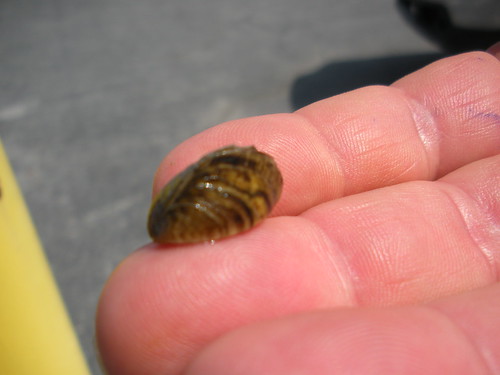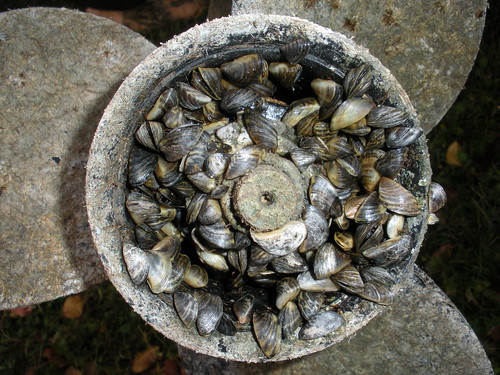Zebra Mussels Flexing Their Way into Geist

Have you noticed any difference in the water clarity of Geist? Some residents believe the water appears clearer lately. This represents a positive attribute for our seven-mile-long body of water — or does it? Many are speculating that zebra mussels are the reason. These freshwater mollusks, which were originally seen as far back as 1769 in the Caspian Sea and Ural River in Russia, have gradually been invading our rivers and lakes in America. Now they have entered Geist. These mussels are a threat to our fishermen, boaters, drinking water system, and ecosystem.
“I was fishing one day and I caught two invasive species in one cast,” says Dan Wise, Service Manager at Geist Lake Marina. Two years ago, Wise was fishing on Geist when he saw a zebra mussel attached to a Chinese mystery snail. It actually was enclosed in the “trap door function” of the startled snail. Luckily, Wise, president of the Fall Creek Valley Bassmasters in Pendleton, was already well read on the various invasive species when he lured his prized-catch that day. Wise was the first person to report finding a zebra mussel in Geist.
What Are They?

Zebra mussels, whose scientific name is dreissena polymorpha, are also called bivalves because they have two valves or shells – one on the left and one on the right. Incidentally, their dark-striped pattern against the light-beige-colored valve is how zebra mussels earned their name. However, some shells are either real dark or light thereby hindering the appearance of stripes altogether. Since their shells are extremely sharp, recreational users of Geist should consider wearing wading shoes in order to avoid stepping on them and getting cuts on their feet.
Ranging in size from 1 to 2 inches long, zebra mussels are native to freshwater rivers and lakes in Western Asia and Eastern Europe but were first discovered in the United States in 1988 in Lake St. Clair (located between Lake Huron and Lake Erie.) In 1990, they were found in Lake Michigan and by 1991, they were seen in Lakes Wolf, Syracuse, and Wawasee.
Zebra mussels generally live for 4 to 5 years and in water depths of 6 to 24 feet. The female produces between 30,000 and 1 million eggs per year. Their rapid colonization may yield clearer water, but they bring many negative repercussions to our lake.
Why Should We Care About These Intruders?
Zebra mussels negatively impact native aquatic species, eventually affecting entire ecosystems. These bottom feeders can have detrimental effects on fish populations. They attach themselves to hard surfaces including crayfish, turtles, and native mollusks. Some mussels have been spotted with more than 10,000 zebra mussels adhered to them.

As seen in the Great Lakes region, zebra mussels have created a filtering activity at such an amazing rate that the water looks much clearer. The assumption would be that the water is cleaner. Unfortunately, this is not true. In actuality, the more visible water (depleted of algae) leads to a food reduction for microscopic organisms. A large zebra mussel population can cause a decrease in other animals such as fish, mollusks, and birds. Unfortunately, the algae and animals consumed by zebra mussels are also the food for larval fish and other native species.
Wise has expressed concern of the impact of zebra mussels on the “Eurasian watermilfoil” a feathery foliage plant commonly seen in aquariums that has somehow made its way into Geist (possibly from people dumping contents of aquariums.) He says, “As zebra mussels make the water clearer, the sunlight penetrates the water easier causing the milfoil to grow deeper. I have seen boat propellers tangled up in the milfoil.”
Also, as this foliage continues to spread, fishermen will have a harder time as their hooks get entangled. Wise recalls one time when he was fishing: “My hook got caught up in a large piece of milfoil. As I pulled it out of the water, there were hundreds of zebra mussels dangling from it. It sounded like a bunch of Christmas lights clanking together.”
These organisms have already proved to be costly to water users and power plants that have spent millions of dollars cleaning them out of their facilities. Feeding on algae, the zebra mussels filter water via a siphon—about one liter a day! They also like to attach themselves to the insides of pipes in order to have a steady stream of water and food flowing near them. They can clog water intake pipes which is a concern since Indianapolis obtains drinking water from Geist.
Treatment for Clustering of Zebra Mussels
“It’s amazing just how ‘explosive’ the growth rate has gotten in just a couple of years,” says Dave Irish, board member of the Geist Lake Coalition. “The problem will continue to grow ‘exponentially’ to a point that nobody really knows what all issues they will create or how to fix the problems until it is too late and permanent damage has been done.”
Although some chemicals can kill zebra mussels, they would also destroy other forms of life in the lake. Removal of these invaders has been done by mechanical scrapers, air, hot water, chemicals, and sound. New methods are currently being investigated. Unfortunately, there is not one perfect solution for all affected facilities and situations. Irish comments, “It doesn’t really matter if they’re at the bottom of the lake or attached to the top of a log, the zebra mussels are there and don’t appear to be going away!”
Five-Day Drying or Hot-Water Cleaning
Now that the zebra mussels have invaded our lake, one thing we can do is help to prevent the spreading of these aggressive species into other bodies of water such as Morse and Eagle Creek Reservoirs which have not been affected yet.
“We need to be careful not to transport these mussels from one lake to another,” says Scott Rodgers, Steering Committee Chair of Geist Fall Creek Watershed Alliance and VP & Co-Founding Director of Geist Lake Coalition. He continues, “These mussels are like hitchhikers in that they attach themselves to the bilge or hull of the boats.” They can even plug up the water intake on the inboards and outboards.
“Boaters should allow their boats and trailers to dry for five days before entering another body of water,” says Doug Keller, DNR Aquatic Habitat Coordinator. “The zebra mussels and veligers (larvae stage) will not survive out of water past five days.” Keller recommends going to a carwash or power washing the hull and trailer and flushing out the motor with water at least 140 degrees. Furthermore, boat lifts and piers should be disinfected if they are removed from Geist and placed in another lake.
The water in Geist may appear clearer to some this summer. Keller believes, “This may be due to a combination of both the lack of rainfall with no more nutrients and sediments coming into the lake and the two years of zebra mussels colonizing.”
With regards to helping preserve Geist Lake, Rodgers recommends, “We should all help support our legislators on clean water initiatives including those from an individual standpoint.”




Comments 2
First year owning a boat and put it out at the marina. I noticed my boat running slower than normal after a month in the water. We got the boat up on the trailer to find millions of them covering the bottom of the boat and up inside my propeller and lower unit. Unbelievable!
5